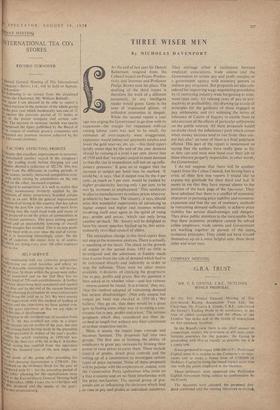THREE WISER MEN
By NICHOLAS DAVENPORT
AT the end of last year Sir Dennis Robertson resigned from the Cohen Council on Prices, Produc- tivity and Incomes and Professor Phelps Brown took his place. The drafting of the third report is therefore the work of a different economist, as any intelligent reader would guess. Gone is the note of inspissated gloom, of orthodox economics in despair. While the second report a year ago was urging the Government to go slow with its expansion—the margin for expansion without raising labour costs was said to be small, the estimates of over-capacity were exaggerated, expansion would reduce our payments surplus and lower the gold reserves, etc. etc.—this third report boldly states that by the end of the year demand should be running at a level 4 per cent. above that of 1958 and that we expect output to meet demand so that the rise in expenditure will not set up infla- tionary pressures.' It goes on to suggest that the increase in output per head may be marked. 'It could be,' it says, 'that if output rose by the 4 per cent., as much as 3 per cent, would be yielded by higher productivity, leaving only I per cent. to be met lay increases in employment.' This reinforces its plea to manufacturers to reduce prices wherever productivity has risen. The country, it says, should seize this wonderful opportunity of advancing to higher output and higher real incomes without involving itself once again in the spiral of rising pay, profits and prices, 'which can only bring another set-back.' Mr. Amory will be delighted to have his recent speeches backed up by this extra- ordinarily revivified council of elders.
The miraculous change in this third report does not stop at the economic analysis. There is actually a searching of the heart. The check to the growth of output in the period from 1955 to 1958 is investigated and the admission is frankly made that it came from the side of demand which had to be restrained directly and indirectly in order to stop the inflation. There were no other means available, it declares, of checking the progressive rise in pay, profits and prices. But the question is then asked as to whether other—and less ruinous —means cannot be found. 'It is evident,' they say, 'that the method adopted of restraining demand has serious disadvantages.' (Not only output but output per head was checked in 1955-58.) 'We believe,' they go on, 'that there would be a great gain in finding some other way of avoiding a con- tinuous rise in pay, profits and prices.' The various proposals which they considered are then de- scribed at length but without any final conclusion as to their respective merits.
Here, it seems, the report loses courage and becomes hesitant. The proposals fall into two groups. The first aim at limiting the ability of employers to grant pay increases by limiting their power to raise prices to cover them. These include control of profits, direct price controls and the setting up of a commission to investigate certain types of price increases. None of these proposals will be popular with the employers or, indeed, with the Conservative Party spokesmen who insist on a free economy and on no State interference with the price mechanism. The second group of pro- posals aim at influencing the decisions which lead to rises in pay and profitsin individual industries. They envisage either a conference between employer associations, trade unions and the Government to review pay and profit margins or a government agency with statutory powers to enforce pay structures. But proposals are also con- sidered for improving wage-negotiating procedures by (i) restricting industry-wide bargaining to mini- mum rates only (ii) relating rates of pay to pro- ductivity or profitability; (iii) drawing up a code of principles for the guidance of those engaged in pay settlements, and (iv) widening the terms of reference of Courts of Inquiry to enable them to take account of the effects of particular settlements on the public interest. All these proposals would no doubt check the inflationary push which comes when money incomes tend to rise faster than out- put but, alas! on none of them is a final judgment offered. This part of the report is tantamount to saying that the authors have really gone as far as they can and must now hand over their job to those who are properly responsible, in other words, the Government.
I do not suppose that there will he another report from the Cohen Council, but having been a critic of their first two reports I would like to express my gratitude for their third and last. It seems to me that they have moved almost to the position of the back page of the Spectator. They have admitted that there is a conflict of economic objectives in pursuing price stability and economic expansion and that the use of monetary methods • in restraining demand sufficiently to achieve price stability has serious disadvantages and dangers. They draw public attention to the inescapable fact that these economic problems cannot be solved unless employers, trade unions and Government are working together in pursuit of the same, economic principles. They could not have wound themselves up on a more helpful note, these three older and wiser men.


































 Previous page
Previous page